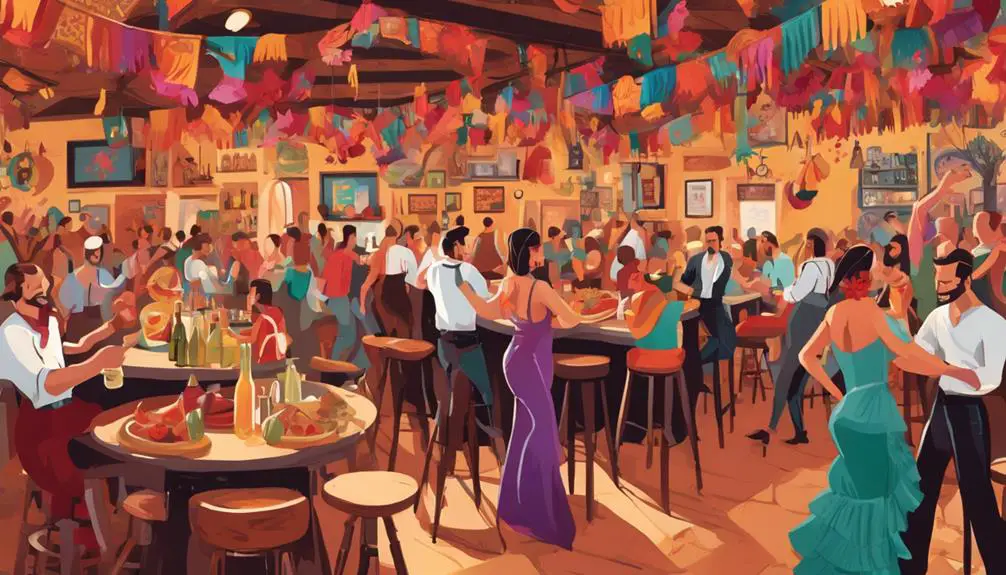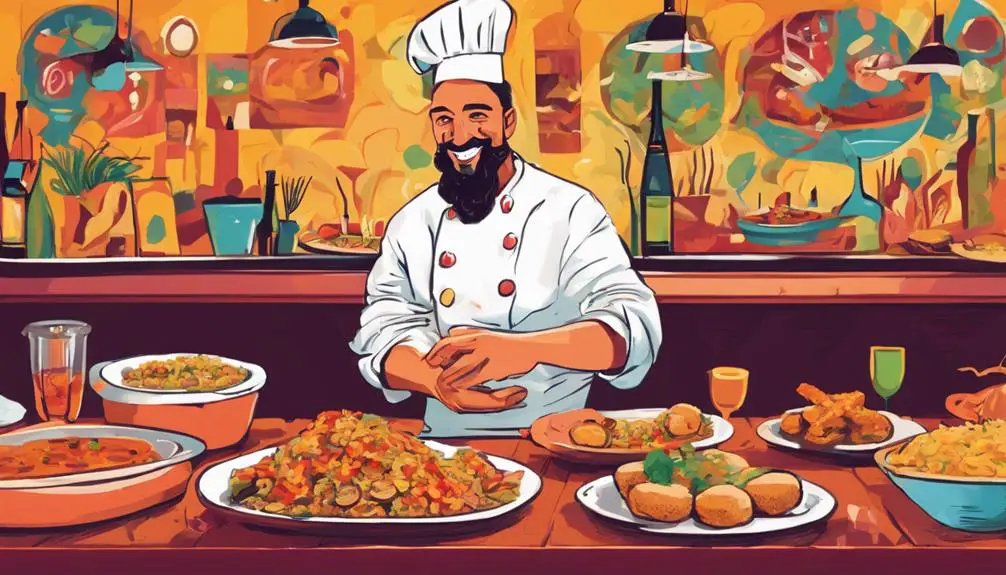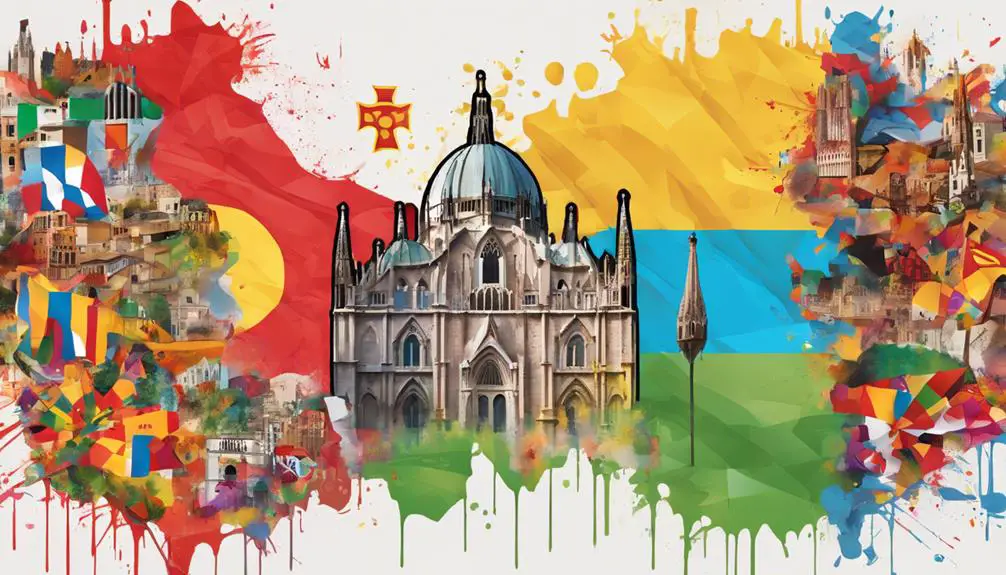When you immerse yourself in Spanish slang, you'll find that it's not a one-size-fits-all deal. Spain and Latin America have distinct dialects, colloquialisms, and cultural nuances. In Spain, you'll encounter 'caña' and 'tapa' in social settings, while Argentina has its own unique flavor with 'boludo' and 'che'. Insults can be playful, but be aware of cultural taboos. Master clever compliments, and you'll be the life of the party. From foodie slang to party etiquette, each region has its own flair. As you explore Spanish slang, you'll uncover a rich cultural heritage – and it's just the beginning of your linguistic adventure.
Slangin' in Spain

When you're traversing the streets of Madrid or Barcelona, you'll quickly realize that the Spanish spoken in Spain is distinct from the Spanish spoken in Latin America, with its own unique slang and colloquialisms that can leave even the most seasoned language learners perplexed.
As you navigate the tapas scene, you'll encounter 'caña' (a small beer) and 'tapa' (a small plate of food), which are staples of Spanish social life. But beware of 'tapas tribulations' – the struggle is real when trying to order the perfect combination of snacks and drinks!
Amidst the lively atmosphere, you might stumble upon a Flamenco performance, where the passionate dance and music will leave you enchanted. The Flamenco flair is undeniable, and its rhythmic energy will have you tapping your feet in no time.
To truly immerse yourself in the Spanish experience, understanding the local slang and idioms is crucial. By doing so, you'll gain a deeper insight into the culture and people, and your Spanish adventure will become even more unforgettable.
Argentina's Street Talk
Your Argentine friends will toss around phrases like 'boludo' (a colloquial term for 'dude') and 'che' (a casual way to address friends) as you explore the vibrant streets of Buenos Aires. As you navigate the city, you'll notice the distinct Buenos Aires dialect, which sets itself apart from other Spanish-speaking regions. The locals' rapid-fire speech and unique vocabulary will keep you on your toes.
You might catch snippets of Lunfardo, a slang language born in the early 20th century, which blends Italian, Spanish, and indigenous languages. Outside of Buenos Aires, you'll encounter regional dialects like the Cordoba colloquialisms. The city of Cordoba, known for its rich history and cultural heritage, has its own distinct flavor of Argentine Spanish.
You might hear phrases like 'che boludo' (a friendly greeting) or ' Dale!' (an expression of excitement or agreement). As you immerse yourself in Argentine culture, you'll find that each region has its own unique linguistic flair. Embracing these differences will enrich your experience and help you connect with the locals on a deeper level.
Insults That Sting

As you navigate the nuances of Argentine Spanish, you'll soon discover that mastering the art of playful insults is an integral part of socializing with locals. It's a delicate balance between being playful and respectful, as crossing the line can lead to unintended offense.
In Argentina, verbal fencing is an art form, and locals take great pride in their ability to trade clever insults without causing harm. However, it's essential to be aware of cultural taboos and avoid sensitive topics, such as politics or family, which can quickly escalate into uncomfortable situations.
To avoid missteps, focus on lighthearted teasing and clever wordplay, which are staples of Argentine humor. Remember, the goal is to show wit and cleverness, not to cause genuine offense.
Compliments That Kill
In Argentine culture, mastering the art of clever compliments is just as essential as wielding witty insults, and you'll find that locals respond enthusiastically to praise that's both sincere and cleverly phrased. You'll notice that Argentineans are masters of sweet talk, and their killer charm can disarm even the toughest critics. When you learn to dish out genuine, cleverly crafted compliments, you'll earn their respect and admiration.
In Argentina, compliments aren't just empty flattery; they're a way to show appreciation and build connections. You'll find that locals respond well to clever wordplay, clever turns of phrase, and witty observations.
When you master the art of giving compliments that kill, you'll become the life of the party, and people will gravitate towards you. So, don't be afraid to dish out those clever compliments – just make sure they're sincere and specific.
With practice, you'll develop a killer charm that will leave a lasting impression on those around you.
Slang for Foodies

You'll frequently stumble upon colorful slang terms when dining out in Argentina, where foodies and locals alike use them to add flavor to their conversations about food. As you navigate menus and chat with servers, you'll pick up on Tasty Terms that'll make you sound like a native.
For instance, 'boca' refers to a small snack or appetizer, while 'picada' is a shared plate of goodies. When you're craving something sweet, ask for 'dulce de leche' – a caramel-like spread that's a Foodie Fave. If you're in the mood for something savory, 'milanesa' is a breaded and fried cutlet that's a staple in Argentine cuisine.
Don't be afraid to use these slang terms when ordering – it'll show your server you're in the know! And who knows, you might just get some insider tips on the best dishes to try.
Party Like a Local
When the sun dips below the horizon, Buenos Aires transforms into a vibrant party scene, and knowing the right slang will get you invited to the hottest gatherings.
To party like a local, you'll need to master fiesta etiquette. For starters, don't show up empty-handed – bring a bottle of vino or cerveza to share with the group. When you arrive, greet the host with a warm '¿Cómo estás?' (how are you?) and a kiss on the cheek.
As the night heats up, you'll need to know your clubbing lingo. When someone asks '¿Vamos a bailar?' (do you want to dance?), you'll know it's time to hit the dance floor. If you're feeling thirsty, ask '¿Dónde está el bar?' (where's the bar?) and order a 'fernet con coca' (a popular Argentine cocktail).
By speaking the language of the party scene, you'll be well on your way to becoming an honorary porteño (Buenos Aires native).
Regional Slang Showdown

From Patagonia to Mendoza, each region in Argentina boasts its unique slang, and mastering these regional differences will elevate your Spanish skills and help you better connect with locals.
You'll notice that each region has its own distinct flavor, shaped by its history, geography, and cultural influences. For instance, the Andean regions of Argentina, such as Jujuy and Salta, have been influenced by the indigenous Quechua language, resulting in a distinct dialect that blends Spanish with native words and phrases.
This dialect diversity is a result of cultural fusion, where Spanish colonizers, African slaves, and indigenous peoples converged, creating a rich tapestry of languages and dialects.
In Buenos Aires, for example, you'll hear a distinct blend of Italian and Spanish, reflecting the city's history of European immigration. As you travel through Argentina, you'll discover that each region's slang is a reflection of its unique cultural heritage.
Frequently Asked Questions
Is Spanish Slang Used Differently in Formal and Informal Settings?
When communicating in Spanish, you'll notice that slang usage varies depending on the setting. In formal settings, like business meetings or academic environments, you'll rarely hear slang.
However, in informal social contexts, like casual gatherings or online forums, regional nuances and colloquial expressions abound.
You'll pick up on distinct social contexts where slang is more prevalent, like with friends or in casual online communities, versus professional or formal events where Standard Spanish is preferred.
Can Spanish Slang Be Used in Professional or Academic Writing?
When writing professionally or academically, you'll want to take into account the tone you're conveying. Using slang in these contexts can be tricky, as it may compromise the tone's authenticity.
While you want to sound relatable, you must respect language boundaries. Generally, it's best to avoid slang in formal writing, opting for standard language instead.
This guarantees your message remains clear and respectful, without blurring the lines between informal and formal communication.
How Does Spanish Slang Vary Across Different Age Groups?
When exploring how Spanish slang varies across different age groups, you'll notice distinct generational differences. Age-specific vocabulary emerges as a key factor, with younger generations adopting trendy expressions that older groups may not understand.
For instance, Gen Z uses 'guapo' to mean 'cool,' while older adults might use 'chido' for the same meaning. As you investigate the nuances, you'll find that each age group has its unique slang, shaped by cultural and historical contexts.
Are There Any Spanish Slang Words That Are Universally Understood?
When exploring Spanish slang, you'll find that as you investigate further, some words transcend regional dialects. Despite variations, certain slang terms have evolved to become universally understood.
You'll notice that words like 'guay' (cool) and 'chido' (awesome) are widely recognized across age groups and regions. This slang exploration has led to a shared vocabulary, allowing speakers to communicate effectively across different dialects.
As you probe deeper, you'll discover that these universally understood terms have become an integral part of the Spanish language.
Can Non-Native Speakers Use Spanish Slang Without Sounding Awkward?
As you venture into the world of Spanish slang, you wonder: can you pull it off without sounding awkward?
The answer lies in cultural immersion, language exchange, and native mentorship. Authentic pronunciation and fluency hurdles will fade away as you surround yourself with native speakers.
Don't be afraid to learn from mistakes – with time and practice, you'll seamlessly integrate slang into your speech, and your Spanish will start to flow like a native's.
Conclusion
As you've navigated the labyrinth of Spanish slang, you've cracked the secrets of the streets. Your vocabulary is now a canvas of colorful expressions, woven with the threads of culture and history.
Like a master weaver, you've intertwined the diverse dialects, creating a rich tapestry of communication.
Now, go forth and converse like a native, for in the world of Spanish slang, you're the maestro.







